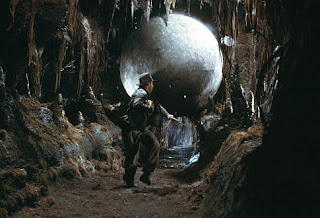 I hadn’t read the book before seeing the film, but given that pretty much everyone else has, I’m not going to worry about giving away spoilers. Eva Khatchadourian (Tilda Swinton) and her husband Franklin (John C. Reilly) have two children. One, Celia, is a sweet, perfect little girl who wouldn’t hurt a fly. She idolises her older brother, Kevin (Ezra Miller), who, unfortunately, is a raving sociopath. The trouble is, only Eva can see it, and it is she who has to deal with the consequences when Kevin commits a high school massacre. The film follows their relationship from his birth to her visits to him in prison.
I hadn’t read the book before seeing the film, but given that pretty much everyone else has, I’m not going to worry about giving away spoilers. Eva Khatchadourian (Tilda Swinton) and her husband Franklin (John C. Reilly) have two children. One, Celia, is a sweet, perfect little girl who wouldn’t hurt a fly. She idolises her older brother, Kevin (Ezra Miller), who, unfortunately, is a raving sociopath. The trouble is, only Eva can see it, and it is she who has to deal with the consequences when Kevin commits a high school massacre. The film follows their relationship from his birth to her visits to him in prison.The title is an odd one. Eva and Franklin certainly did need to talk about Kevin, but they never broach the subject. The onus is on Eva to tell Franklin about what a monster he is, but she doesn’t do it forcefully enough – he brushes away her concerns and she gives up. Is she ashamed of her perceived failings as a mother? Does she tell herself she is over-reacting? Or does she simply lack the courage to bring up the possibility that her son has somehow become a lunatic? Even after it is implied that Kevin and a bottle of bleach are responsible for the loss of one of Celia’s eyes, which Eva suspects, she does nothing. Is she the real monster here? This might explain the way she stays in town after the massacre when she could have moved away, as a kind of penance for her inaction. Tilda Swinton will almost certainly get an Oscar nomination for her finely-balanced performance as a mother struggling to connect with her son and carry on after he has made her life almost unliveable.
 Ramsay provides no motivation for Kevin’s actions, seeming to suggest that he was evil from birth. Often, as with the Columbine massacre, the perpetrators are ostracised from their peers, but we never see Kevin at school or interacting with anyone other than his family. We see him throughout his life: only stopping his crying when held by Franklin rather than Eva as a baby and spraying paint all over the walls of Eva’s map room as a toddler. However, Eva can be seen as a classic unreliable narrator. Looking back over Kevin’s life, she may be twisting events to show that he was evil from birth, when really her lack of empathy towards him as a woman who never wanted to have children pushed him towards his unenviable place in history. Ramsay leaves this up to the viewer, but her direction throughout is largely cliché-ridden and ponderous. She obviously doubts her audience’s intelligence, pointlessly featuring the colour red in almost every scene, from jam sandwiches to cans of tomato soup, as a signpost to the horror yet to come, when I’m sure most people would have understood her intention in the first five minutes of the film. In addition, the flashbacks and flashforwards are initially confusing – until Kevin is born, it is difficult to tell exactly where you are in the narrative.
Ramsay provides no motivation for Kevin’s actions, seeming to suggest that he was evil from birth. Often, as with the Columbine massacre, the perpetrators are ostracised from their peers, but we never see Kevin at school or interacting with anyone other than his family. We see him throughout his life: only stopping his crying when held by Franklin rather than Eva as a baby and spraying paint all over the walls of Eva’s map room as a toddler. However, Eva can be seen as a classic unreliable narrator. Looking back over Kevin’s life, she may be twisting events to show that he was evil from birth, when really her lack of empathy towards him as a woman who never wanted to have children pushed him towards his unenviable place in history. Ramsay leaves this up to the viewer, but her direction throughout is largely cliché-ridden and ponderous. She obviously doubts her audience’s intelligence, pointlessly featuring the colour red in almost every scene, from jam sandwiches to cans of tomato soup, as a signpost to the horror yet to come, when I’m sure most people would have understood her intention in the first five minutes of the film. In addition, the flashbacks and flashforwards are initially confusing – until Kevin is born, it is difficult to tell exactly where you are in the narrative. The film’s greatest achievement is the way it portrays the ambiguity of the relationship between Kevin and Eva, as well as the reasons behind Kevin’s massacre of his classmates. Fittingly in the run-up to Halloween, it comes across as a very modern horror film, let down only by its clogged direction.
3.5/5


